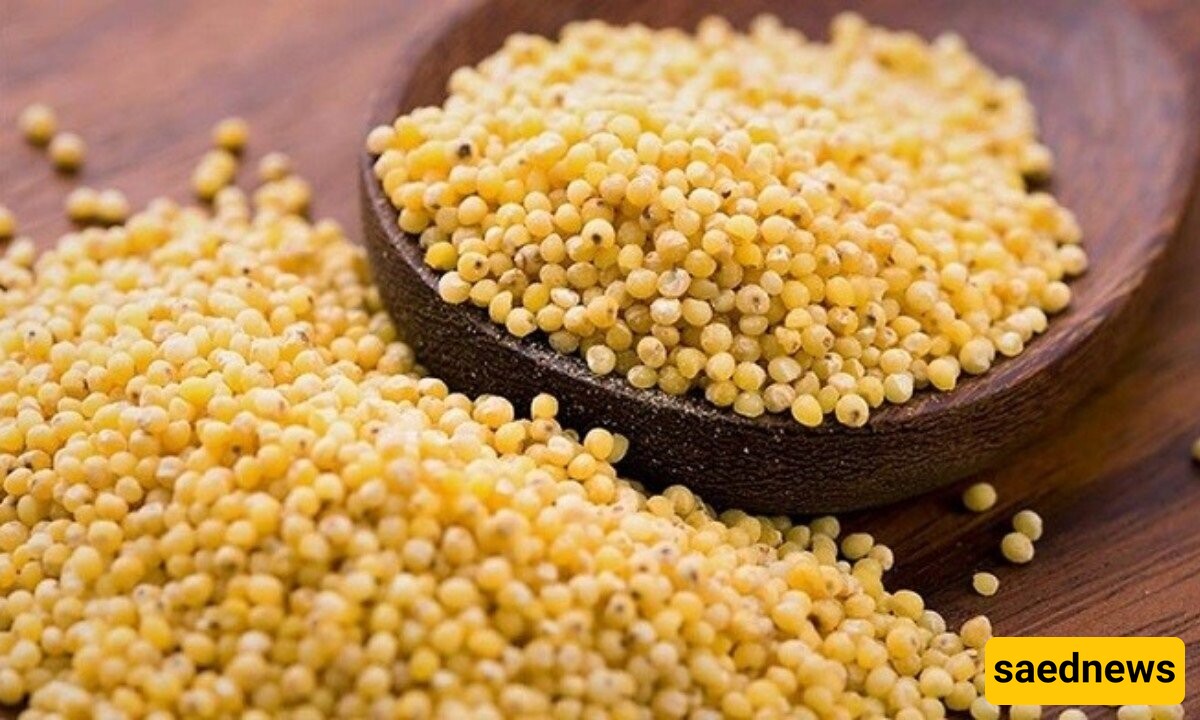SAEDNEWS: Millet is a type of grain with spherical seeds that can be yellow, white, or brown. Its germ is relatively large compared to the size of the grain, similar to maize. Millet is often used as bird feed but is also a nutritious grain for humans. In this article, we explore the benefits of millet.

According to SAEDNEWS, Millets are a small group of nutrient-dense whole grains that thrive in dry areas, especially in Asia and Africa. This ancient grain has been cultivated for over 10,000 years in East Asia. It comes in various types, with pearl and finger millet being the most common. Although millet is often associated with bird feed, it is widely consumed in many countries, particularly in China, Africa, and India, to prepare a variety of dishes.

Millet is highly valued for its nutritional content, making it a staple in many developing countries. It is rich in essential nutrients, including high amounts of starch, B vitamins, calcium, iron, potassium, zinc, and magnesium. Millet also provides healthy fats, protein, and dietary fibers.
Rich in Nutrients: Millet contains significant amounts of protein (15%), fiber, B complex vitamins (niacin, folacin, riboflavin), minerals (iron, magnesium, phosphorus, manganese, potassium, calcium, zinc), essential amino acids (methionine, lecithin), and vitamin A. It is also rich in phytochemicals like phytic acid.
Gluten-Free: Millet is a gluten-free grain, making it suitable for people with celiac disease or gluten sensitivity. It is also easily digestible and has low allergenicity.
Diabetes Management: Millet can help reduce the risk of type 2 diabetes and manage blood glucose levels in diabetics by improving insulin resistance through increased adiponectin protein concentration.
Digestive Health: The high fiber content in millet promotes digestive health and regular bowel movements. It also contains prebiotics that increase gut microbiota, supporting overall gut health and immunity.
Cardiovascular Health: Rich in magnesium, millet helps regulate heart rhythm. It also contains niacin (vitamin B3), which reduces risk factors for heart disease, such as high cholesterol and triglycerides.
Mood Improvement: The high concentration of the amino acid tryptophan in millet can improve mood and reduce symptoms of depression and anxiety.
Weight Management: Millet consumption can help reduce obesity and high cholesterol, contributing to a lower body mass index and weight loss.
Oxidative Stress Reduction: Millet contains antioxidants that reduce oxidative stress, which can cause chronic diseases like neurological disorders, arthritis, and diabetes. Millet helps protect against brain oxidative stress and reduce Alzheimer's symptoms.
Other benefits of millet include:
Preventing the growth of cancer cells.
Accelerating wound healing.
Maintaining bone health.
Supporting antifungal and antimicrobial activities.
Calories: 378
Fat: 4.2 grams
Carbohydrates: 73 grams
Protein: 11 grams
Fiber: 9 grams
Calories: 207
Fat: 2 grams
Protein: 6 grams
Fiber: 2 grams
Millets are a small group of nutrient-dense whole grains that grow well in dry areas, especially in Asia and Africa. This ancient grain has been cultivated for over 10,000 years and includes varieties such as finger and pearl millet. Millets are highly nutritious and beneficial for various health conditions.

